旅游英语说1
英语口语中各种旅游的含义

英语口语中各种旅游的含义刚刚经过一个端午小长假,很多朋友都出门旅行去了,关于旅行,英语中有travel, journey,trip等等的说法,你知道这些词有什么区别吗?TravelAs a noun, 'travel' refers to the activity in general and is generally used as an uncountable noun.travel做名词的时候指的是旅行这种行为本身,通常用作不可数名词。
例句:I enjoy travel and playing golf.我喜欢旅行和打高尔夫。
Travel and music are two of my favorite activities.旅行和音乐是我最喜欢的两件事。
'Travel' can also be used as a verb and refers to the activity of moving from one place to another. Generally, 'travel' is used as a general verb and is rather formal. People often use the mode of transport to express this activity.travel还可以用作动词,指的是从某地到另一地的行为。
通常travel这个动词很正式,人们更愿意用交通工具来表达这种行为。
例句:I travelled by plane to Madrid. = I flew to Madrid.我坐飞机去了马德里旅行。
=我飞去马德里的。
She travelled more than three hundred miles to get to the meeting. = She drove more than three hundred miles to get to the meeting.她穿越三百多公里来到会场。
旅游英语单词大全

旅游英语单词大全引言旅游是一种非常受欢迎的休闲活动,而英语是国际交流中最重要的语言之一。
因此,掌握一些旅游相关的英语单词是非常必要的。
本文将为您提供一个旅游英语单词大全,并附带释义和示例,帮助您在旅行过程中更好地进行交流。
交通工具1. rplane /ˈɛrpleɪn/ (n.)•Definition: A powered flying vehicle with fixed wings and a weight greater than that of the r it displaces.•Example: I will go to Paris by rplane.2. trn /treɪn/ (n.)•Definition: A connected line of rlroad cars with or without a locomotive.•Example: We took a trn from London to Edinburgh.3. bus /bʌs/ (n.)•Definition: A large motor vehicle carrying passengers by road, typically one serving the public on a fixed route and for a fare.•Example: We took a bus tour around the city.4. taxi /ˈtæksi/ (n.)•Definition: A car licensed to transport passengers in return for payment of a fare.•Example: We hled a taxi to the hotel.5. subway /ˈsʌbweɪ/ (n.)•Definition: An underground electric rlroad.•Example: I take the subway to work every day.旅游景点1. beach /biːtʃ/ (n.)•Definition: A pebbly or sandy shore of a body of water, especially one along the ocean or lake.•Example: We spent the day relaxing on the beach.2. museum /mjuːˈziːəm/ (n.)•Definition: A building in which objects of historical, scientific, artistic, or cultural interest are stored and exhibited.•Example: We visited the Louvre Museum in Paris.3. monument /ˈmɑːnjəmənt/ (n.)•Definition: A statue, building, or other structure erected to commemorate a famous or notable person or event.•Example: The Statue of Liberty is a famous monument in New York City.4. zoo /zuː/ (n.)•Definition: An establishment that mntns a collection of wild animals, typically in a park or gardens, for study, conservation, or display to the public.•Example: We saw many exotic animals at the zoo.5. cathedral /kəˈθiːdrəl/ (n.)•Definition: The principal church of a diocese, with which the bishop is officially associated.•Example: We visited the Notre-Dame Cathedral in Paris.旅游活动1. sightseeing /ˈsaɪtˌsiːɪŋ/ (n.)•Definition: The activity of visiting places of interest in a particular location.•Example: We went sightseeing in Rome and visited all the famous landmarks.2. hiking /ˈhaɪkɪŋ/ (n.)•Definition: The activity of long, vigorous walks, especially in the countryside.•Example: We went hiking in the mountns and enjoyed the beautiful views.3. shopping /ˈʃɑːpɪŋ/ (n.)•Definition: The activity of buying goods from stores.•Example: We did some shopping at the local markets.4. swimming /ˈswɪmɪŋ/ (n.)•Definition: The sport or activity of moving through water by moving one’s body.•Example: We went swimming in the ocean.5. camping /ˈkæmpɪŋ/ (n.)•Definition: The activity of spending a vacation living in a tent or camper.•Example: We went camping in the national park.旅行服务1. hotel /hoʊˈtɛl/ (n.)•Definition: An establishment providing accommodations, meals, and other services for travelers and tourists.•Example: We booked a room at a five-star hotel.2. restaurant /ˈrɛstərɑːnt/ (n.)•Definition: A place where people pay to sit and eat meals that are cooked and served on the premises.•Example: We had dinner at a local restaurant.3. tour guide /tʊr ɡaɪd/ (n.)•Definition: A person who guides visitors in the language of their choice and interprets the cultural and natural heritage of an area.•Example: Our tour guide showed us around the city.4. travel agency /ˈtrævəl ˈeɪdʒənsi/ (n.)•Definition: A business that arranges travel andaccommodation for travelers.•Example: We booked our trip through a travel agency.5. souvenir /ˌsuːvəˈnɪr/ (n.)•Definition: An item that is kept as a reminder of a person, place, or event.•Example: I bought a souvenir keychn from the gift shop.结论以上是一个涵盖旅游英语单词的大全,涵盖了交通工具、旅游景点、旅游活动以及旅行相关的服务。
旅游英语课件Unit 1 Travel and Tourism
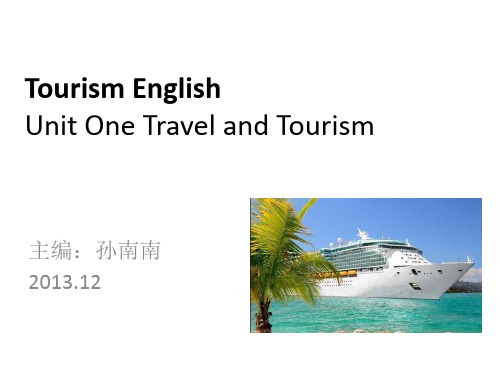
主编:孙南南 2013.12
Section A Passage Reading
Text A Travel Agency
Background Information:
1. Thomas Cook 近代旅游业之父 In 1841, as secretary of the South Midland Temperance
Section A Passage Reading
Text B Independent Travel
New Word: resident [ 'rezidənt ] n. 居民 bulk [ bʌlk ] n. 大部分,大块,容量 facility [ fə'siliti ] n. 设施,设备 book [ buk ] v. 预定,登记 at short notice 在短时间内,立刻 transfer [ træns'fə: ] n. 转让,转移,传递 baggage [ 'bægidʒ ] n. 行李
Package holidays are organized by a tour operator and sold to a consumer by a travel agent. Some travel agents are employees of tour operators, others are independent.
Association, Thomas Cook persuaded the Midland Countries Railway Company to run a special train between Leicester and Loughborough for a temperance meeting on July 5. He organized an excursion for his members at a fare of one shilling return. It turned out to be an immediate success—altogether 570 seats were sold. For his efforts Cook received a 5 percent commission. Although not the first excursion train run in England, it was believed to be the first publicly advertised excursion train organized by a middleman. Thus Thomas Cook ct rail excursion agent whose pioneering efforts were eventually to be copied widely in all parts of the world.
英语四个旅游的用法

英语四个旅游的用法旅游是一种广泛受欢迎的休闲活动,使人们能够探索新的地方、体验不同的文化,并且放松心情。
在英语中,有四个常用的动词短语用来描述旅游的不同方面,它们分别是"go on a trip"、"go sightseeing"、"take a vacation"和"travel abroad"。
接下来,本文将对这四个动词短语的用法进行详细介绍。
1. go on a trip"Go on a trip"是指出门旅行,通常表示离开家或办公室,到外地或其他城市旅游。
这个短语可以用来描述长时间的旅行,也可以指短时间的周末或度假旅行。
例如:- I'm going on a trip to Paris next week.- We went on a road trip to the countryside last summer."Go on a trip"也可以用来表示参加组织的旅行活动。
例如:- Our school is organizing a trip to the museum.- Are you planning to go on a ski trip this winter?2. go sightseeing"Go sightseeing"指的是游览名胜古迹或观光景点,主要强调观光目的地的参观和欣赏。
这个短语通常用来描述在旅行中游览著名景点或参观感兴趣的地方。
例如:- We went sightseeing in Rome and visited the Colosseum.- When you visit New York City, don't miss the opportunity to go sightseeing in Central Park."Go sightseeing"还可以用来表示参观城市的文化和历史名胜。
旅游的英文是什么的相关英语知识

旅游的英文是什么的相关英语知识旅游在英语的表达中根据旅游时间的长短和性质分为很多种。
下面店铺为大家带来旅游的英语意思和相关用法,欢迎大家一起学习! 旅游的英语意思tour;traveltrip旅游的相关英语短语旅游班车 sightseeing bus;旅游标志 tourist symbol;旅游船 houseboat;旅游地理学 tourist geography; geography of tourism;旅游点 tourist spot;旅游环境 tourist environment;旅游纪念品 tourist souvenir;旅游界 the tourist circle;旅游林 tourist forest;旅游迷 great travel buff;旅游牧场 dude ranch;旅游年 tourist year;旅游区 tourist area;旅游热 travel [tourist] boom;旅游山庄 tourists' mountain villa;旅游衫 outing shirt;旅游胜地 tourist attraction;旅游市场 tourist market;旅游事业 tourist industries; tourist trade;旅游图 tourist map;旅游团 tourist group; tourist team;旅游旺季 peak tourist season; tourist rush season;旅游文学 tourist literature;旅游污染 tourist pollution;旅游销售点 shops at tourist attractions;旅游鞋 sneakers; tourist shoes;旅游心理学 tourist psychology;旅游学校 tourism school; travel school;旅游业 tourism; tourist industry;旅游运动 tourism sports;旅游者 tourist;旅游证 tourist card;旅游指南 guidebook旅游的英语短句develop and supervise tourism;发展与管理旅游事业a round-the-world tour;环球旅游Some countries obtain large sums of foreign exchange from tourism.有些国家靠旅游业赚取大量外汇。
英语作文 Travel旅游(优秀10篇)
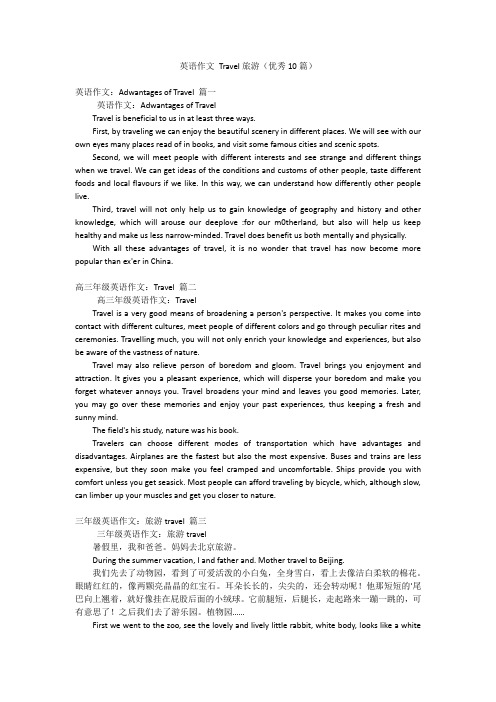
英语作文Travel旅游(优秀10篇)英语作文:Adwantages of Travel 篇一英语作文:Adwantages of TravelTravel is beneficial to us in at least three ways.First, by traveling we can enjoy the beautiful scenery in different places. We will see with our own eyes many places read of in books, and visit some famous cities and scenic spots.Second, we will meet people with different interests and see strange and different things when we travel. We can get ideas of the conditions and customs of other people, taste different foods and local flavours if we like. In this way, we can understand how differently other people live.Third, travel will not only help us to gain knowledge of geography and history and other knowledge, which will arouse our deeplove :for our m0therland, but also will help us keep healthy and make us less narrow-minded. Travel does benefit us both mentally and physically.With all these advantages of travel, it is no wonder that travel has now become more popular than ex'er in China.高三年级英语作文:Travel 篇二高三年级英语作文:TravelTravel is a very good means of broadening a person's perspective. It makes you come into contact with different cultures, meet people of different colors and go through peculiar rites and ceremonies. Travelling much, you will not only enrich your knowledge and experiences, but also be aware of the vastness of nature.Travel may also relieve person of boredom and gloom. Travel brings you enjoyment and attraction. It gives you a pleasant experience, which will disperse your boredom and make you forget whatever annoys you. Travel broadens your mind and leaves you good memories. Later, you may go over these memories and enjoy your past experiences, thus keeping a fresh and sunny mind.The field's his study, nature was his book.Travelers can choose different modes of transportation which have advantages and disadvantages. Airplanes are the fastest but also the most expensive. Buses and trains are less expensive, but they soon make you feel cramped and uncomfortable. Ships provide you with comfort unless you get seasick. Most people can afford traveling by bicycle, which, although slow, can limber up your muscles and get you closer to nature.三年级英语作文:旅游travel 篇三三年级英语作文:旅游travel暑假里,我和爸爸。
旅游英语怎么说

★频道为友整理的《旅游英语怎么说》,供⼤家参考学习。
旅游⽤英语怎么说?只会说可不⾏,也要知道怎么写,旅游⽤英语怎么写呢?旅游渐渐成为⽣活中的热潮,⼀种⼤众化的⾏为,关于旅游的种种我们应该怎么样表述呢?旅游也分很多种有跟团旅游、红⾊旅游、蓝⾊旅游、⽂化旅游等等,下⾯⼴州汉普森英语⼩编就教⼤家怎么样来⽤英语说,⼀起来看看详细的内容吧。
⼤众旅游: An Italian environmental group warned on Monday that mass tourismwas slowly eroding the Venice lagoon, which it said was also threatened by major real estate development and an inadequate transport network. ⼀个意⼤利环保组织周⼀警告说,⼤众旅游正在慢慢侵蚀威尼斯泻湖,房地产业的发展和交通络的不完善也对威尼斯泻湖形成了威胁。
上⽂报道中的mass tourism就是“⼤众旅游”,指的是现代旅游活动开始形成的以有组织的团体包价旅游为代表的⼤众型旅游模式,并且形成⼴⼤民众中占⽀配地位的旅游形式。
常见的⼤众旅游形式是package tour/group tour/organized tour(跟团旅游)。
(⼴州汉普森英语学校) 红⾊旅游业: Nearly 10,000 citizens in Shaoshan -- known as one of China's "red tourism" sites -- marked the date with a 5,000-meter foot race that started from Mao's former residence and ended at the square in front of the Shaoshan Railway Station. 为了纪念⽑泽东诞⾠117周年,韶⼭市有近1万⼈参加了5000⽶竞⾛⽐赛,⽐赛从⽑主席的故居开始,到韶⼭⽕车站⼴场结束。
旅行英语名词
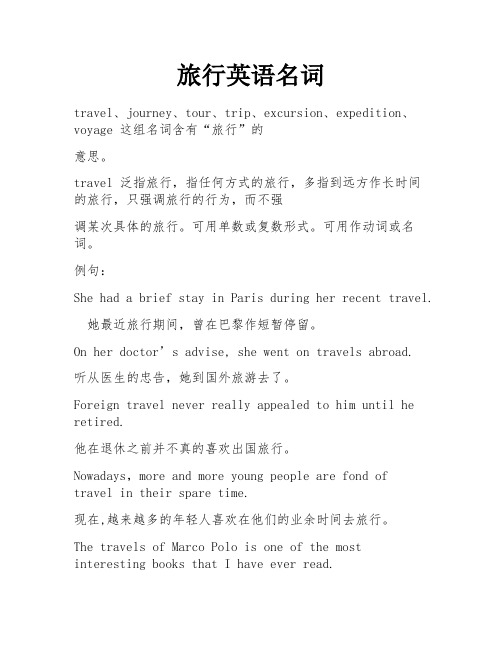
旅行英语名词travel、journey、tour、trip、excursion、expedition、voyage 这组名词含有“旅行”的意思。
travel 泛指旅行,指任何方式的旅行,多指到远方作长时间的旅行,只强调旅行的行为,而不强调某次具体的旅行。
可用单数或复数形式。
可用作动词或名词。
例句:She had a brief stay in Paris during her recent travel.她最近旅行期间,曾在巴黎作短暂停留。
On her doctor’s advise, she went on travels abroad.听从医生的忠告,她到国外旅游去了。
Foreign travel never really appealed to him until he retired.他在退休之前并不真的喜欢出国旅行。
Nowadays,more and more young people are fond oftravel in their spare time.现在,越来越多的年轻人喜欢在他们的业余时间去旅行。
The travels of Marco Polo is one of the mostinteresting books that I have ever read.马可波罗的游记是我生平读过的最有意思的一本书。
Many businesses have found that such holiday travel incentives are very successful.许多企业发现这样的假日旅行奖励是非常成功的。
——————Joe recently traveled to Australia on business. (用作动词)乔最近到澳大利亚出差。
He wished to travel all around the world so that he could study the customs ofdifferent countries.他希望去旅游以研究不同国家的民俗风情。
简单旅游英语对话精选
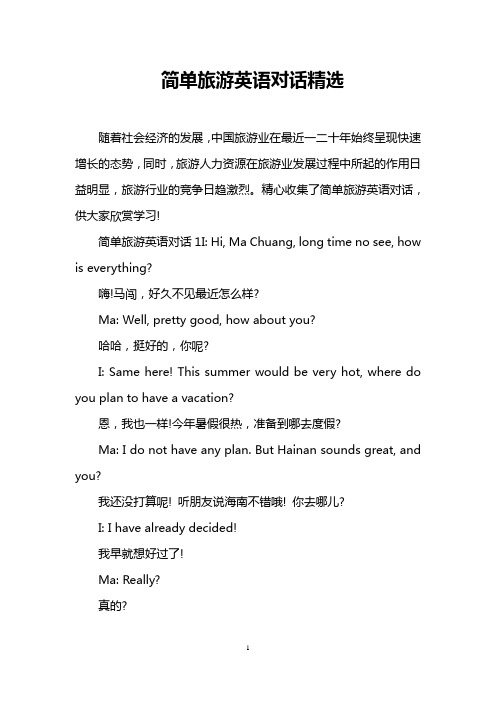
简单旅游英语对话精选随着社会经济的发展,中国旅游业在最近一二十年始终呈现快速增长的态势,同时,旅游人力资源在旅游业发展过程中所起的作用日益明显,旅游行业的竞争日趋激烈。
精心收集了简单旅游英语对话,供大家欣赏学习!简单旅游英语对话1I: Hi, Ma Chuang, long time no see, how is everything?嗨!马闯,好久不见最近怎么样?Ma: Well, pretty good, how about you?哈哈,挺好的,你呢?I: Same here! This summer would be very hot, where do you plan to have a vacation?恩,我也一样!今年暑假很热,准备到哪去度假?Ma: I do not have any plan. But Hainan sounds great, and you?我还没打算呢! 听朋友说海南不错哦! 你去哪儿?I: I have already decided!我早就想好过了!Ma: Really?真的?I: I am planning to go to Guilin.我准备去桂林。
Ma: Is it interesting there?是嘛? 那里好玩吗?I: Without a doubt! Have you ever heard"Guilin's scenery is the best in the world"? Summer there is very cool! With mountains and rivers around, seems I am just in heaven! What I love most is the snacks there, where the snacks are especially diversiform and delicious.恩,当然啦! 听过“桂林山水甲天下”吧!那里的夏季非常凉爽!有山有水,而且又非常的美丽,住在山上感觉就像是在天堂一样!而我最喜欢的就是那里的小吃了,那里小吃特别丰富,美味可口!Ma: Sounds great!恩,听起来不错哦!简单旅游英语对话2wendy: National day is coming!国庆即将到了。
旅游英语 清华大学出版社完整Unit1ppt课件
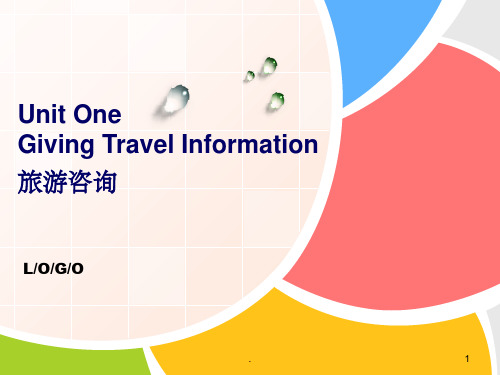
somedomestictypicaltravellingroutesbackgroundknowledgebackgroundknowledgewhentravanizedtravelagenciestransportationitinerarytravelerswecanalsobooktrainticketsairticketstours旅游类型typestours旅游类型inclusivetour包价旅游flydrivepackagetour自驾游conductedtour有导游陪同的旅游foreignindividualindependenttour散客旅游cultureorientedtravel文化旅游escortedtour全程陪同旅游leisuretravel休闲旅游10specialinteresttour专门兴趣旅游11agriculturaltourism农业观光旅游12sportstourism体育旅游practicematerialspracticematerialsdialogueonedecidewhethereachfollowingsentencesmanwantsnewyorknextweek
旅游英语课件Tourism
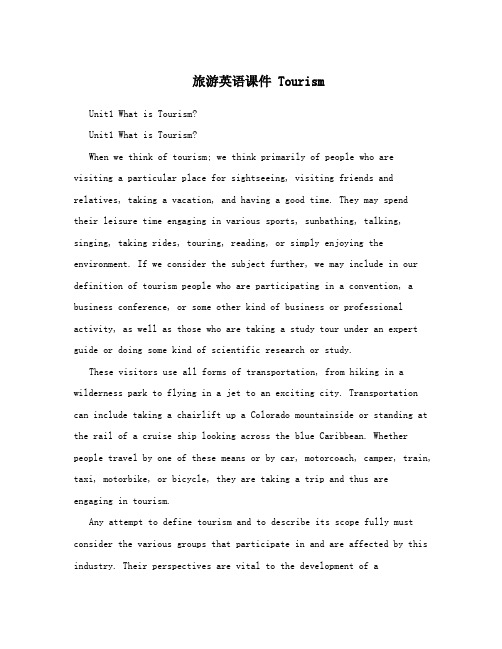
旅游英语课件 TourismUnit1 What is Tourism?Unit1 What is Tourism?When we think of tourism; we think primarily of people who arevisiting a particular place for sightseeing, visiting friends and relatives, taking a vacation, and having a good time. They may spendtheir leisure time engaging in various sports, sunbathing, talking, singing, taking rides, touring, reading, or simply enjoying the environment. If we consider the subject further, we may include in our definition of tourism people who are participating in a convention, a business conference, or some other kind of business or professional activity, as well as those who are taking a study tour under an expert guide or doing some kind of scientific research or study.These visitors use all forms of transportation, from hiking in a wilderness park to flying in a jet to an exciting city. Transportation can include taking a chairlift up a Colorado mountainside or standing at the rail of a cruise ship looking across the blue Caribbean. Whether people travel by one of these means or by car, motorcoach, camper, train, taxi, motorbike, or bicycle, they are taking a trip and thus are engaging in tourism.Any attempt to define tourism and to describe its scope fully must consider the various groups that participate in and are affected by this industry. Their perspectives are vital to the development of acomprehensive definition. Four different perspectives of tourism can be identified:1. The tourist. The tourist seeks various psychic and physical experiences and satisfactions. The nature of these will largely determine the destinations chosen and the activities enjoyed.2. The businesses providing tourist goods and services. Business people see tourism as an opportunity to make a profit by supplying the goods and services that the tourist market demands.3. The government of the host community or area. Politicians view tourism as a wealth factor in the economy of their jurisdictions. Their perspective is related to the incomes their citizens can earn from this business. Politicians also consider the foreign exchange receipts from international tourism as well as the tax receipts collected from tourist expenditures, either directly or indirectly.4. The host community. Local people usually see tourism as acultural and employment factor. Of importance to their group, for example, is the effect of the interaction between large numbers of international visitors and residents. This effect ma be beneficial of harmful, or both.Thus, tourism may be defined as the sum of the phenomena and relationships arising from the interaction of tourists, business suppliers, host governments, and host communities in the process of attracting and hosting these tourists and other visitors.Tourism is a composite of activities, services, and industries that delivers a travel experience: transportation, accommodations, eating and drinking establishments, shops, entertainment, activity facilities, and other hospitality services available for individuals or groups that are traveling away from home. It encompasses all providers of visitor and visitor-related services. Tourism is the entire world industry of travel, hotels, transportation, and all other components, including promotion, that serves the needs and wants of travelers. Finally, tourism is the sum total of tourist expenditures within the borders of a nation or a political subdivision or a transportation-centered economic area of contiguous states or nations. This economic concept also considers the income multiplier of these tourist expenditures.One has only to consider the multidimensional aspects of tourism and its interactions with other activities to understand why it is difficult to come up with a meaningful definition that will be universally accepted. Each of the many definitions that have arisen is aimed atfitting a special1Unit1 What is Tourism?situation and solving an immediate problem, and the lack of uniform definitions has hampered study of tourism as discipline. Development ofa field depends on (1) uniform definitions, (2) description, (3)analysis,(4) predictions, and (5) control.Modern tourism is a discipline that has only recently attracted the attention of scholars from many fields. The majority of studies have been conducted for special purposes and have used narrow operational definitions to suit particular needs of researchers or government officials; these studies have got encompassed a systems approach. Consequently, many definitions of “tourism” and “the tourist” are based on distance traveled, the length of time spent, and the purpose of the trip. This makes it difficult to gather statistical information that scholars can use to develop a database, describe the tourism phenomenon, and do analyes. The problem is not trivial. It has been tackled by a number of august bodies over the years, including the League of Nations, the united Nations, the World Tourism Organization (WTO), the Organization for Economic Cooperation and Development (OECD),the National Tourism Resources Review Commission, and the U.S. Senate?s National Tourism Policy Study.World Tourism OrganizationThe international Conference of Travel and Tourism Statistics convened by the World Tourism Organization (WTO) in Ottawa, Canada, in 1991 reviewed, updated, and expanded on the work of earlierinternational groups. The ottawa Conference made some fundamental recommendations of definitions of tourism, travelers and tourists. The United Nations Statistical Commission adopted WTO? recommendations on tourism statistics on March 4, 1993.TourismWTO has taken the concept of tourism beyond a stereotypical image of “holiday-making.”The officially accepted definition is:Tourism comprises theactivities of persons travelin to and staying in places outside their usual environment for not more than one consecutive year for leisure, business and other purposes.” The term usual envi-ronment is intended to exclude tripswithin the area of usual residence and frequent and regular trips between the domicile and the workplace and other community trips of a routine character.1. International tourism:a. Inbound tourism: visits to a country by nonresidents.b. Out bound tourism: visits by residents of a country to another country.2. Internal tourism: visits by residents of a country to their own country.3. Domestic tourism: internal tourism plus inbound tourism (the tourism market of accommodation facilities and attractions within a country).4.National tourism: Internal tourism plus outbound tourism (the resident tourism market for travel agents and airlines).Traveler Terminology for International TourismUnderlying the foregoing conceptualization of tourism is the overall concept of traveler, defined as “any person on a trip between two ormore countries or between twoor more localities within his/her countryof usual residence.” All types of travelers engaged in tourism are describedas visitors, a term that constitutes the basicconcept of the entire system of tourism statistics. Visitors are persons who travel to a country other than the one in which they generally reside for a2Unit1 What is Tourism?period not exceeding 12 months, whose main purpose is other than the exercise of an activity remunerated from within the place visited. Visitors are subdivided into two categories:1. Same-day visitors: visitors who do not spend the night in a collective or private accommodation in the country visited: for example,a cruise ship passenger spending four hours in a port.2. Tourists: Visitors who stay in the country visited for at least one night: for example, a visitor on a two-week vacation.There are many purposes for a visit, notably pleasure, business, and other purposes, such as family reasons, health, and transit.Wordschairlift an apparatus which carries people up and sown steep slopes in chairs that hang from a moving wire 升降椅;空中缆椅camper a motor vehicle big enough to live in when on holiday, use.Having cooking equipment and beds in the back part 野营车motorbike a motorcycle 摩托车psychic of the mind as opposed to the body精神上的jurisdiction the right to use the power of an official body, esp. in order tomake decisions on questions of law 管辖权;司法权,审判权composite something made up of different parts or materials 混合物,合成物encompass to include or be concerned with (a wide range of activities,subjects, ideas) 包含,包括;涉及subdivision the act of dividing something that has already been divided,or the parts that result from doing this 再分,细分contiguous (to, with) touching, next (to); having a shared borde(正式)接触着的,接近的;接壤的multidimensional 多维的hamper to cause difficulty in movement or activity 阻碍,妨碍;牵制trivial of little worth or importance 琐碎的,没有价值的august lit noble and grand 威严的;高贵的convene to call (a group of people, committee) to meet 召集(会议);召集开会stereotypical as in an overly simple picture or opinion of person, group, orthing老套的,旧框框的consecutive following in regular unbroken order 连续的,连贯的domicile formal or law a person?s home; the place where a person lives or is considered to live for official purposes[法]户籍,正式居住地,信处workplace the room r building in which workers perform their work工作场所;工厂;车间inbound AmE incoming; inward bound 进来的3Unit1 What is Tourism?outbound mowing sway from the speaker or the starting point 外出的,离开出发点underlie to be a hidden meaning or cause of 位于……之下;成为……基础foregoing (the one) that has been mentioned 前面的(事物),刚提到的(事物)conceptualization something that form a concept or concepts of概念化remunerate to reward; pay (someone) for work or trouble(正式)给……报酬;补偿transit the going or moving of people or goods from one place to another通行;过境Additional ReadingText A Mass TourismThe Historical SettingTourism harks back to the conquest of Alexander the Great (356-323BC) and the subsequent development of the Hellenistic urban system. It is argued that tourism requires both large claustrophobic cities and the means to escape from them, both of which were present in Greece during this period.Within modern times, the notion of tourism is closely linked to the idea of the “Grand Tour”,thwhich s panned the 16th to 19 Centuries. The Grand Tour is a “tour of certain cities in Western Europe undertaken primarily, but not exclusively, for education and pleasure”. This later era of grand tourism was typified by long, expensive, “classical” and “romantic” visits, mainly by the British aristocracy, to France, Italy, Germany, Switzerland and the Low Countries. Over time, and with the rise of the middle professional class, the Grand Tour was patronized by a wider segment of the population. Nonetheless, only 3%~4% of the Population represented the nucleus from which Grand Tourists might have be drawn. The golden age of the Grand Tour was the 18th Century, particularly the 30 years before the outbreak of the French Revolutionin 1789. By the 1830s, the length of the Grand Tour fell from an average of 40 months in the mid-16th Century to an average of only 4 months.The growth of tourism to “mass” proportions as it is known today, has its foundation inseveral timely innovations: technologically in the field of transportation; and in the existence of a critical facilitating force, entrepreneurship-in the person of Thomas Cook.In 1815, 1 year after the Battle of Waterloo ended the Napoleonic wars, the first channel crossing by steamer was made (the site of the battle itself becoming a major tourist attraction). By 1812, a regular service was operated between the ports of Dover and Calais. In 1828 the first railways were laid in France and Austria, and in 1844 the railway reached Switzerland. “Thisrevolution in Transport technology and the low cost, speed and efficiency that it provided, led to an immediate expansion of European tourism.”Complementing transportation technology was the existence of entrepreneurial talent, “initiative” and “organizing genius” in the person of Thomas Cook. “His originality lay in his methods, his almost infinite capacity for taking trouble, his acute sense of the needs of his clients, his power of invention and his bold imagination” (Young, 1973). It has been written that “the4Unit1 What is Tourism?father of modern tourism was unquestionable Thomas Cook” (English, 1986). “Cook was the perfect entrepreneur, a brilliant opportunist, quick to sense the need of his clientele…” (Turner and Ash, 1975). Hewas a true Schumpeterian entrepreneur-“a leader, a disturber of the peace”, whohad the initiative, authority, foresight, and intuition and psycheto carry out innovations.Thomas Cook organized travel on a scale that had never been seen before. He heralded an era of organized, large-scale, relatively cheap tourism spread across national, regional and international destinations. If Europe had the “hot spots” for the Grand Tourists, the opening of the Far East, India and America, were the hallmarks of the Cook era. Until the early 1860s, Britain remained the main field of Cook?s activities; in 1862 he moved into Europe; he moved into America in 1866; took his first round-the-world trip in 1872; reached India and the Far East by the 1880s; and the first Cook hotel was established at Luxor (Egypt) in 1877.In 1862, the first true package tours were provided by Cook-all the details of transport and accommodation were pre-arranged for tourists who were, generally, of modest means. Spurred on by his example and the profits made by this entrepreneur, many imitators entered the fray. Turner and Ash write, for example, that …it was not long before his example was imitated; in 1863, the Stangen Travel Agency was established in Breslau. Stangen soon moved his center of operation to Berlin and became a successful rival to Cook? (Tuner and Ash, 1975). By 19th –Century advancesin transport technology, Thomas Cook and Son had effected arevolution in tourism by the end of the century. No longer the preserve of the wealth and the leisured, tourism was now an industry. While an average of 257 people per annum took part in Grand tourism during the 1547-1840 period (Towner, 1985), Cook had taken 20000 people to the Paris Exhibition of 1879-such was the magnitude of his entrepreneurial prowess.Despite the leaps and bounds that the industry experienced, tourism, until the 1930s, was still a matter of trains, boast and coaches. Travel by water transportation was a very important form of tourism during the 1920s and 1930s. The ships themselves were a form of floating hotel, where the act of travel was equated with tourism. Travel was seen as an end in itself. As if the industry has gone full circle, today, cruise tourism is one of the fastest growing segments of the international tourism industry.It was in 1950 that the first package holiday built around air transport was organized. This was undertaken by Vladimir Raitz, a Russian émigré educated at the London School of Economics. His successful company, Horizon Holidays (now merged with Thomson, the largest UK operator) was one of the top three tour operators in Britain. By the 1960s, the package holiday business began to use air transport in a major way as Raitz?s competitors, spurred on by his success also began using the aircraft.Still, foreign travel in the 1930s remained a luxury commoditywithin the reach of only a privileged few having both plenty of free time and considerable purchasing power. This picture was to change when, coupled with post-war peace and prosperity, came innovations in aircraft technology and changes in labor legislation, which provided paid holidays, and the development of the package tour. Aided by these innovations, mass tourism had arrived.Mass Tourism DefinedMass tourism is a phenomenon of large-scale packaging ofstandardized leisure services at fixed prices for sale to a mass clientele. Mass tourism refers to key characteristics that the international tourism industry displayed during the 1960s, 1970s, and 1980s. Mass tourism exists5Unit1 What is Tourism?if the following conditions hold.1. The holiday is standardized, rigidly packaged and inflexible, no part of the holiday could be altered except by paying higher prices.2. The holiday is produced through the mass replication of identical units, with scale economies as the driving force.3. The holiday is mass marketed to an undifferentiated clientele.4. The holiday is consumed en masse, with a lack of consideration by tourists for local norms, culture, people or the environments oftourist-receiving destinations.Standardization and rigidity are very clear characteristics ofpackage tours offered on a large scale. An inclusive charter tourprovides the same level of transportation, accommodation, meal andtransfer services to all the clients who pay the same price, visit the same sun destination, sunbathe on the same beaches, sleep in the samehigh-rise hotels and in the same type of beds, read the same tourist brochures, visit the same sites, stay the same length of time, take the same kinds of photographs and even buy the same souvenirs.Within the confines of mass, standardized and rigidly packaged tourism, choice, individuality, personalized services and flexibilityare just not possible (or where possible, it is at horrendous prices compared with the package price). There is little place within mass tourism for the individual who wishes to be different from the crows,who wishes to use different accommodation or participate in different holiday activities. It is true that many tourists have avoided the ?mass?tourist holidays and many have used the relatively cheap services of mass tourism as launching pads for their own vacations. However, in the 1960s and the 1970s, these were the exceptions rather than the common trend.Mass tourism certainly had its time and place. Today the tourism industry is in crisis. Mass tourism is no longer best practice.Conditions the gave birth to it –the frame conditions, consumers, technology, production and management practices-are themselves changing. Understanding how mass tourism came about and why it was bestpractice at the time are key to understanding why international tourism industry is being transformed and the shape that the new best practice is taking.Text B the Implications of New TourismNew tourism will change the boundaries of the tourism industry and radically alter the position of industry players. Players closest to consumers (e.g. travel agents, hotels, cruise ships) and those incontrol of the industry?s information (e.g. those that own CRSs) are expected to gain.CRSs will increasingly become the flexible alternative to pre-packaged holidays offered by tour operators. The role of tour operators is expected to decline in importance. It is no longer relevant whether a company is an airline, a travel agent, hotel or tour operator. What becomes more relevant are the activities along the value chain that they control.These changes imply a radical transformation of the opportunities available to the various players in the tourism industry. New functions and demands will emerge (e.g. quality control, flexible holidays). While at the same time other key activities will become less important (e.g. pre-packaged tours). Thus, the position of each player within the value chain will have to be re-thought. In addition, as the rules of the game continue to change, the pressures of cooperation and /or concentration are likely to be more intense.Diagonal integration-a process whereby firms use information technologies to logically6Unit1 What is Tourism?combine services for best productivity and most profitability-willbe one of the most significant developments in the international travel and leisure industry. Diagonal integration will become a international travel and leisure industry. It will continue to blur the boundaries among industry players and make the travel and tourism industry a system of wealth-creation. Already, the boundaries within the tourism industry, and between this industry and others, are becoming increasingly blurred. Players are crossing each others? borders more than ever before: banks moveinto travel agencies; insurance companies acquire hotel interests; airlines provide credit card; department stores operate travel agencies; and pleasure-boat companies move into hotels.The industry, as a result of this trend, will become more“system”-like in nature. One of thekey implications of the trend towards diagonal integration is that competitors will increasingly come from outside the industry. Equally, diagonal integration will offer opportunities for travel and tourism players to move into other industries, particularly services.New tourism holds a number of key implications for industry players. In what follows, we will briefly examine some of the implications for tour operators, travel agents, and hotels.Tour OperatorsSeveral of the value-creation activities of tour operators will decline inimportance-particularly those of packaging, risk brokerage and distribution. These functions are being increasingly superseded by computerized reservation systems. In response to the declining importance of key activities, tour operators will have to take action several fronts. They will have o: t, create more flexible packaged holidays;, expand their information functions (e.g. provide computerized reservation niches for specific products of destinations);, develop creative relationships with travel agencies (selected agents could have the option of flexible packaging holidays on-line from the tour operator?s portfolio); and, control the quality of the product at al levels.Quality control at all crucial phases in the delivery of the holiday will become a key source of competitive advantage for tour operators. Tour operators will have to take a far broader view of the holiday that they deliver. They will have to find ways of better controlling and influencing the product delivered to consumers.Travel agenciesThe importance of travel agency reservations, ticketing the client advice functions are all expected to grow in importance. Already travel agencies handle a large and growing proportion of airline bookings. In creating more value from these activities, travel agencies will have to use their CRSs creatively and provide the information that consumers want.It is to ensuring the satisfaction of the travel consumers that agencies must give priority in order to ensure their own long-term survival and competitiveness. The ability of travel agents to acquire, provide and transmit unbiased information in a courteous, efficient and timely manner will be key to their competitive success. Indeed, a competitor agency will be able to copy a convenient …high-street? location, subscribe to the same airline reservation system and place satellite printers in their corporate clients? offices. However, a competitor will have tremendous difficulty in copying travel agency personnel who place the interest of the consumers first, causing them to be loyal.New opportunities for travel agencies to create value will emerge in the areas of packaging7Unit1 What is Tourism?and in the representation of services other than those of tour operators. Travel agencies will have the information at their finger-tip to provide flexible itineraries. Strategically, through cooperation withother agencies, agents can increase buying power with airlines and other suppliers in order to obtain competitive prices for package components. This will allow travel agencies the avenue to provide competitively priced, flexible holiday packages. Travel agencies will also find it profitable to represent other services such as cruise ships, pleasure boats, car-rental companies, hotels, spas and other segments that will grow in importance in the travel and leisure industry.HotelsHotels will no longer be able to leave their marketing to tour operators or their reservations systems. They will have to get closer to their consumers and to travel agents in the market place. This is the only way that hotels will be able to adjust effectively their products to suit their changing clients. Being close to consumers and supplying the experiences they want have become so important that hotels can no longer simply sit back and expect their rooms to be sold.One of the key ingredients in the success of Sandals and SuperCluball-inclusive hotels in the Caribbean, for example, is the strong links they have established with travel agents in the marketplace. Nothing is left to chance. Sandals and SuperClub employ sales agents in the arketplace whose business it is to travel the length and breath of the USA (and increasingly mEuropean) markets to educate travel agents about their product, new services, new properties and new experiences being offered.Hotels will have to work more closely with their guests, listen to them and modify the services they offer to meet the new demands. Hotels will also have to identify market niches, segment the market and provide the experiences that consumers want and for which they are willing to pay.什么是旅游一提到旅游,我们首先会想到这样一些人:他们到某个特定的景点去观光、去拜访朋友或亲戚、去度假,并且过得很愉快。
旅游的英语作文traveling(精选26篇)

旅游的英语作文traveling(精选26篇)旅游的英语作文traveling(精选26篇)在日常学习、工作抑或是生活中,大家都经常看到作文的身影吧,作文是人们把记忆中所存储的有关知识、经验和思想用书面形式表达出来的记叙方式。
那要怎么写好作文呢?以下是小编精心整理的旅游的英语作文traveling,欢迎阅读与收藏。
旅游的英语作文traveling 篇1With the rapid development of economy, the number of Chinese traveling abroad has increased enormously, which definitely benefits both China and the world.In the past three years, the number of Chinese traveling abroad has kept a high growth rate. In accordance with the figures from a survey, there were about 7.5 million people traveling abroad in 1999. In the year after 1999, the number continued to rise. By 20xx, it reached 10 million people. And the year 20xx saw an ever-growing number of 12.1 million people going abroad.The reasons why the number of Chinese traveling abroad grows so rapidly are just as follows. First of all, after 20 years reform and opening up to the world, our economy has developed very quickly. Now Chinese have more money in their pockets than before. They can do whatever they want. Moreover, with more spare money in their hands, many Chinese would like to better the quality of their lives by going out to see different people, to hear different ideas and experience different cultures. And traveling abroad is just one way on the list to meet their demands.From the above analysis, we can easily draw the conclusion that such an increase in the number of people traveling abroadis reasonable and will continue to prove on a rise.【参考译文】随着经济的快速发展,中国出国旅行的数量大为增加,这绝对好处中国和世界。
Unit1《旅游英语》PPT课件
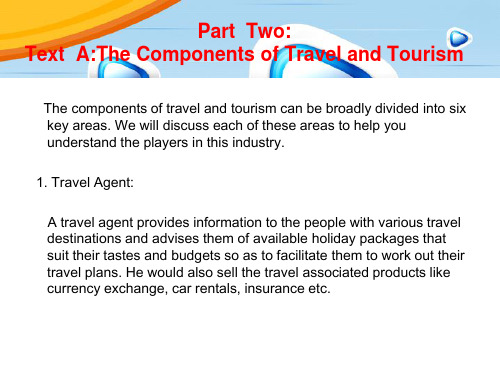
This component consists of those who provide accommodations to people in the form of hotels, resorts, apartments, camps, guesthouses etc. The accommodations may be marketed individually or through the tour operators in the form of package. Direct marketing may require huge costs on advertisements while sales through a tour operator may guarantee the occupancy rate throughout a holiday season. These service providers also take care of the catering needs of the people by providing them with huge cafeterias, various fast food outlets in house or in the form of a galleria.
(Adapted from Technofunc)
Part Three: Text B: A Brief History of Tourism
The history of tourism can be traced back to ancient years. As ancient world empires grew in Africa, Asia and the Middle East, the infrastructure necessary for travel such as land routes and water ways were created and vehicles and other means for travel were developed. During the Egyptian dynasties, travel for both business and pleasure began to flourish and hospitality centers were built along major routes and in the cities to accommodate travelers travelling between central government posts and outlying territories. At the height of the Assyrian empire, the means of travel were improved, the roads were improved, and markers were established to indicate distances and directions. Later, the Persians made further improvement to the road systems and developed four-wheeled carriages for transportation.
英文中旅游的表达
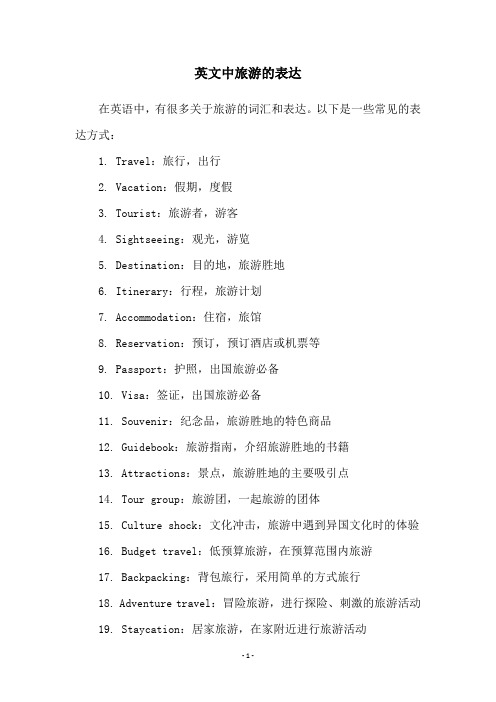
英文中旅游的表达
在英语中,有很多关于旅游的词汇和表达。
以下是一些常见的表达方式:
1. Travel:旅行,出行
2. Vacation:假期,度假
3. Tourist:旅游者,游客
4. Sightseeing:观光,游览
5. Destination:目的地,旅游胜地
6. Itinerary:行程,旅游计划
7. Accommodation:住宿,旅馆
8. Reservation:预订,预订酒店或机票等
9. Passport:护照,出国旅游必备
10. Visa:签证,出国旅游必备
11. Souvenir:纪念品,旅游胜地的特色商品
12. Guidebook:旅游指南,介绍旅游胜地的书籍
13. Attractions:景点,旅游胜地的主要吸引点
14. Tour group:旅游团,一起旅游的团体
15. Culture shock:文化冲击,旅游中遇到异国文化时的体验
16. Budget travel:低预算旅游,在预算范围内旅游
17. Backpacking:背包旅行,采用简单的方式旅行
18. Adventure travel:冒险旅游,进行探险、刺激的旅游活动
19. Staycation:居家旅游,在家附近进行旅游活动
20. Road trip:自驾旅行,使用自己的车辆旅行
以上是一些旅游相关的英语表达,希望对您的旅游英语有所帮助。
旅游用英语怎么说读
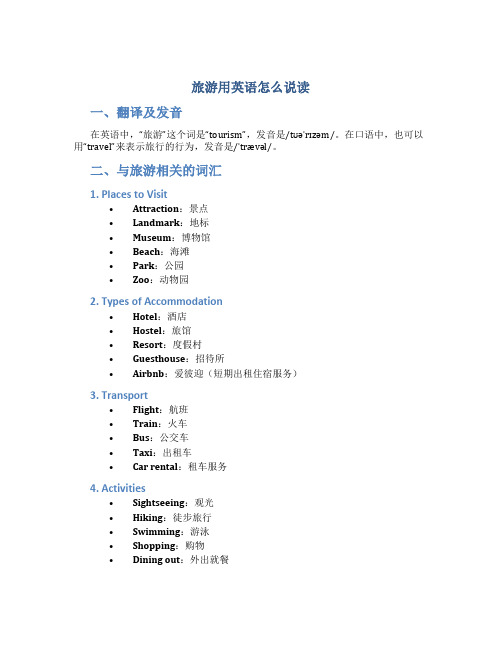
旅游用英语怎么说读一、翻译及发音在英语中,“旅游”这个词是“tourism”,发音是/tʊəˈrɪzəm/。
在口语中,也可以用“travel”来表示旅行的行为,发音是/ˈtrævəl/。
二、与旅游相关的词汇1. Places to Visit•Attraction:景点•Landmark:地标•Museum:博物馆•Beach:海滩•Park:公园•Zoo:动物园2. Types of Accommodation•Hotel:酒店•Hostel:旅馆•Resort:度假村•Guesthouse:招待所•Airbnb:爱彼迎(短期出租住宿服务)3. Transport•Flight:航班•Train:火车•Bus:公交车•Taxi:出租车•Car rental:租车服务4. Activities•Sightseeing:观光•Hiking:徒步旅行•Swimming:游泳•Shopping:购物•Dining out:外出就餐三、常用口语表达1.Can you recommend any good restaurants around here?(你能推荐这附近的好餐厅吗?)2.How can I get to the nearest bus station?(我怎样能到最近的公交车站?)3.Do you have a map of the city?(你们有这座城市的地图吗?)4.What time does the museum open?(博物馆什么时候开门?)5.I’d like to book a double room for two nights, please.(我想订一个双人房间,两晚,谢谢。
)四、常见旅游问题1. 通常如何支付酒店的预订费用?大多数情况下,您可以使用信用卡或借记卡在线支付预订费用。
一些酒店也接受现金支付或支付宝等第三方支付平台。
2. 在旅行途中如何保持安全?确保随身携带重要证件和贵重物品。
- 1、下载文档前请自行甄别文档内容的完整性,平台不提供额外的编辑、内容补充、找答案等附加服务。
- 2、"仅部分预览"的文档,不可在线预览部分如存在完整性等问题,可反馈申请退款(可完整预览的文档不适用该条件!)。
- 3、如文档侵犯您的权益,请联系客服反馈,我们会尽快为您处理(人工客服工作时间:9:00-18:30)。
Security check: they will scan every person and X-ray their handbagge Boarding
Unit 5 en route
Learning objective
To be familiar with the article To understand what we should do at road To learn the new words and new phrases Using the new words and phrases to make a dialogue about on route
Unit 2 preparations before tour
Learning objective
To be familiar with the article To understand what we should do before we leaving To learn the new words and new phrases Using the new words and phrases to make a dialogue about preparations
Washington flyer service Washington flyer taxi Super shuttle Washington flyer coach service Tickets Metrorail Rental cars Hotel/motel shuttles Disabled assessable courtesy service
Unit 7 ground transportation
Learning objective
To be familiar with the article To understand what we should do when we reach the destination To learn the new words and new phrases Using the new words and phrases to make a dialogue about destination
旅游专业英语说1
Unit 1 Introduction to tourism industry
Learning objective
To be familiar with the article To understand what the tourism industry is To learn the new words and new phrases Using the new words and phrases to make a dialogue about tourism industry of china
Definitions: travel agent/travel consultants Different kinds of travel agent .there is a clear distinction between those travel agents who sell air tickets and those who do not. Licensing and registration Structure of your business Space and infrastructure Amenity value Accessibility/road
At intermediate airport Changing flight Boarding again
Unit 6 arrival
Learning objective
To be familiar with the article To understand what we should do when we reach the destination To learn the new words and new phrases Using the new words and phrases to make a dialogue about destination
Metrobus Limousine service Greyhound airport service
Unit 8 cruise
Learning objective
To be familiar with the article To understand what the cruise is To learn the new words and new phrases Using the new words and phrases to make a dialogue about cruise
Marketing and advertising: brochures, internet, television and word of mouth Job outlook projected employment growth stems from increased spending on tourism and business travel over next decade
Unit 4 airport
Learning objective
To be familiar with the article To understand what travel agency is To learn the new words and new phrases Using the new words and phrases to make a dialogue about travel agency of china
Sixth;fulfill tourist need for leisure and cultural activities. last: multiplier effect As a result, tourism has been seen as economic cornerstone Nowadays tourism industry is firmly established as…...
Airport tax: some airports levy airport tax on passengers/airport construction fee Check in: check-in procedures vary by airline Checked in baggage: check with your air carrier for specific guidelines Hand baggage: important papers and travel documents should be carried on board by passenger
Introduction to the industry A cruise offers all the things most people want in a vacation The groundwork for the modern day cruise day cruise industry was laid down as far as the early 1950’s 1960’s -1970’s-1980’s Economic of scale The late 1990’s saw the arrival of several ships in the 110000-145000-ton size with cabin capacities range between 2500 and 3000 passengers
On the ight briefing Keep the overhead storage bin free of heavy articles Listen to the flight attendants Let the flight attendant pour your hot drinks Don’t drink too much Food Immigration card and customs declaration card
Before arrival :before landing in us, you should fill in two forms, namely I-94 arrival-department record and customs form Arrival Getting out of plane Baggage claim Baggage tracing customs
Unit 3
travel agency
Learning objective
To be familiar with the article To understand what travel agency is To learn the new words and new phrases Using the new words and phrases to make a dialogue about travel agency of china
Cruising companies and lines: Carnival corporation, royal caribbean, princess cruises and norwegian cruise lines the worldwide cruise industry is now valued at $15bn north America…… continental Europe….. Asia……
Tourism is a distinctly modern phenomenon The tourism is now viewed as one of the most important and fastest growing industries The reasons why tourism industry make great contribution to the society First: great source of tax revenue Second: foremost economic activities Third : stimulates enormous investment in infrastructure Forth: promote the smaller industries Fifth : improve cultural creativity and cultural infrastrcture
